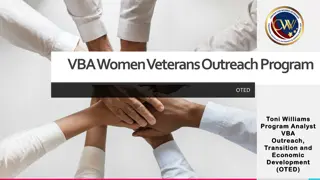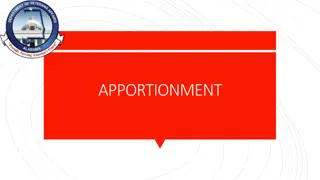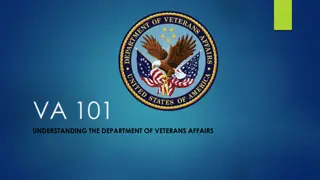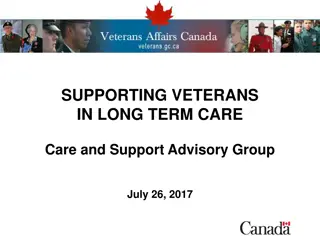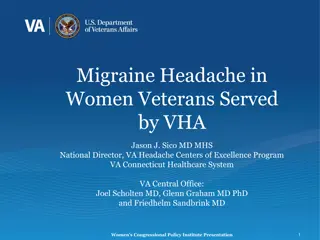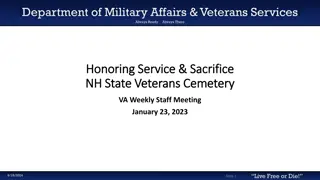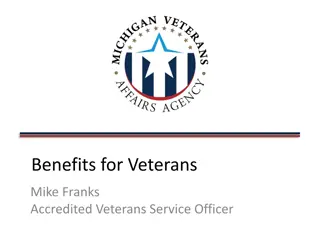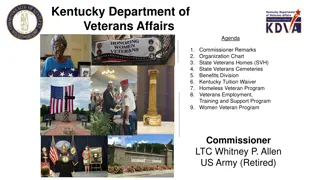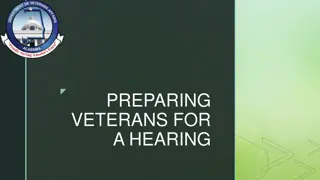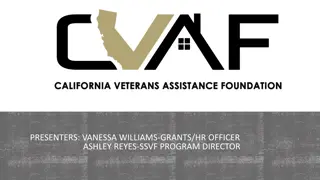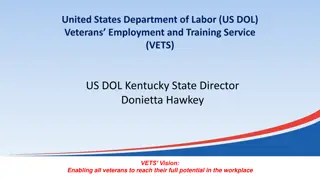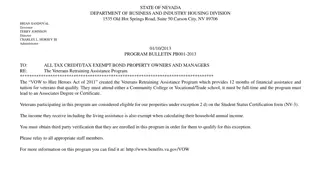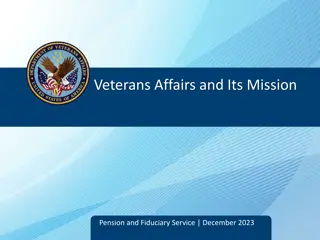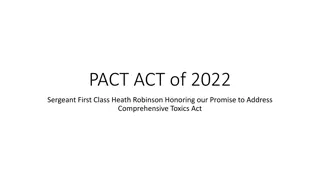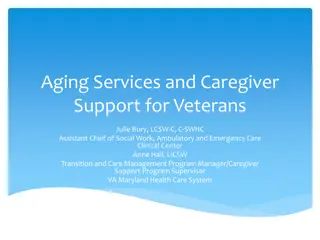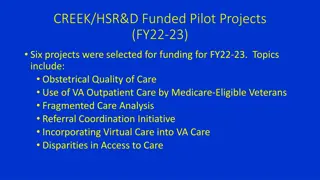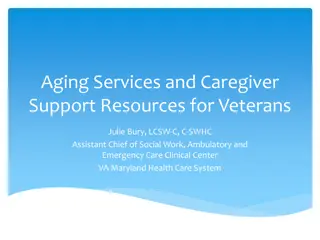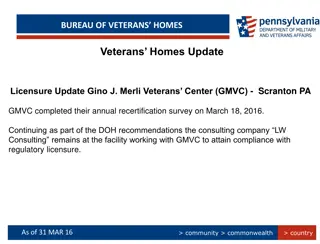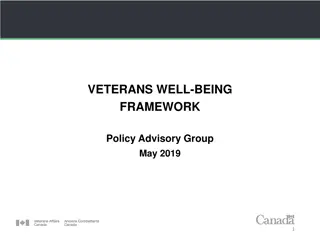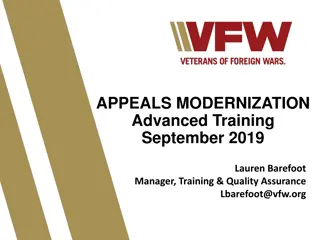Veterans' Health and Care in the UK
Veterans in the UK encompass individuals who have served in the HM Armed Forces or as Merchant Seafarers in conflict situations. There are about 5 million veterans in the UK, supported by the NHS post-service. The unique challenges faced by veterans including health risks and the importance of accessible medical records and prioritized healthcare are highlighted.
Download Presentation

Please find below an Image/Link to download the presentation.
The content on the website is provided AS IS for your information and personal use only. It may not be sold, licensed, or shared on other websites without obtaining consent from the author. Download presentation by click this link. If you encounter any issues during the download, it is possible that the publisher has removed the file from their server.
E N D
Presentation Transcript
VETERANS HEALTH 2016
Who is a veteran? In the UK, a veteran is defined as anyone who has served for at least one day in HM Armed Forces (Regular or Reserve) or Merchant Seafarers who worked alongside Service personnel in legally defined conflict situations. Those who leave before 4 years of service are known as early service leavers.
How many veterans are there in the UK? There are about 5 million veterans in the UK, half of whom served before 1960. Service personnel are removed from GP lists when they join the services. Primary care is instead provided for service personnel by the Ministry of Defence (MoD). However, veterans and families of service personnel remain the responsibility of the NHS. Approximately, 18,000 service people move back to civilian life every year, including roughly 2000 who leave the services on medical grounds
Why are Veterans Different? Military Covenant: A career in the Armed Forces differs from all others. Service personnel agree to forgo certain civil liberties and to follow orders including orders to place themselves in harm s way in the defence of others. In return the nation promises to help and support those in the Armed Forces and their families when they need it most. Risk of death and serious injury: The risk of death (occupational attributable mortality) for the army has been approximately 1:1000 per year in recent years. 150 times higher than the rate for the general working population. Risk of ongoing health problems: As well as the possibility of sustaining serious physical injuries veteran s may be affected by other occupational illness such as hearing loss, depression, anxiety and PTSD. Early service users often receive less support in terms of transition packages and may be particularly vulnerable to mental health and social problems such as homelessness.
Accessing Medical Records Service personnel are given a summary of their medical records on discharge Full service medical records can be obtained from the Army or RAF or Royal Navy just apply as you would for any other patient
Priority Veterans can be prioritised in receiving treatment where their health problem relates to their time in service; however, this is subject to the clinical needs of others. Military service should carry no disadvantage for veterans in obtaining healthcare. To alert the hospital to prioritise your referral you should insert the following text into your referral letter:- As this patient is a military veteran and his (or her) current condition may be related to military service, this referral should be considered for priority treatment under the rules set out in the Commissioning Board Mandate and Armed Forces Covenant. The highly mobile nature of military service means that, for example, hospital appointments can often be missed or delayed. Families of service personnel may find that they move locations more frequently than others. This can cause difficulties in accessing NHS services in their new area or keeping their place on a hospital waiting list. This may be particularly problematic when there is a long wait for a service.
Sources of help The following websites may provide useful information for ex-service personnel and families of those still serving: The Royal British Legion (RBL) Tel: 08457 725 725 http://www.britishlegion.org.uk Soldiers, Sailors, Airmen Families Association (SSAFA) Forces Help Tel: 0845 1300 975 http://www.ssafa.org.uk Combat Stress 24-hour helpline Tel: 0800 138 1619 http://www.combatstress.org.uk Service Personnel and Veterans Agency (SPVA) Tel: 0800 169 2277 (free-phone UK only) http://www.veterans-uk.info NHS Choices, Veterans: mental health http://www.nhs.uk/Livewell/Militarymedicine Big White Wall Tel: + 44 (0)20 70601677 http://www.bigwhitewall.com
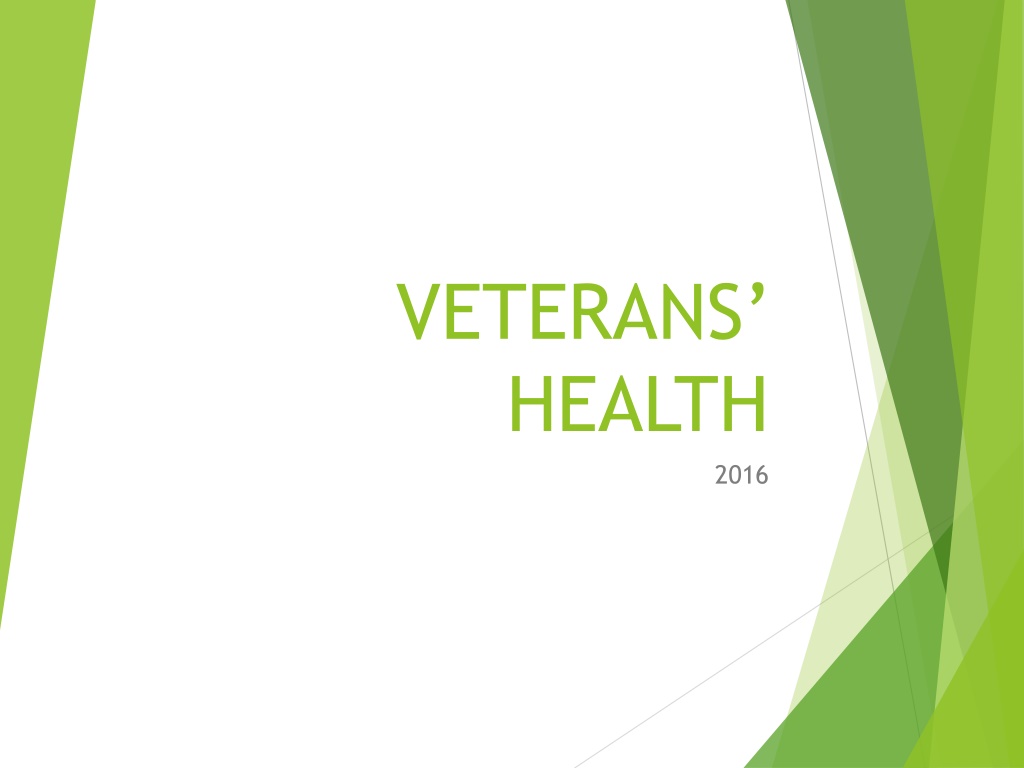
 undefined
undefined



